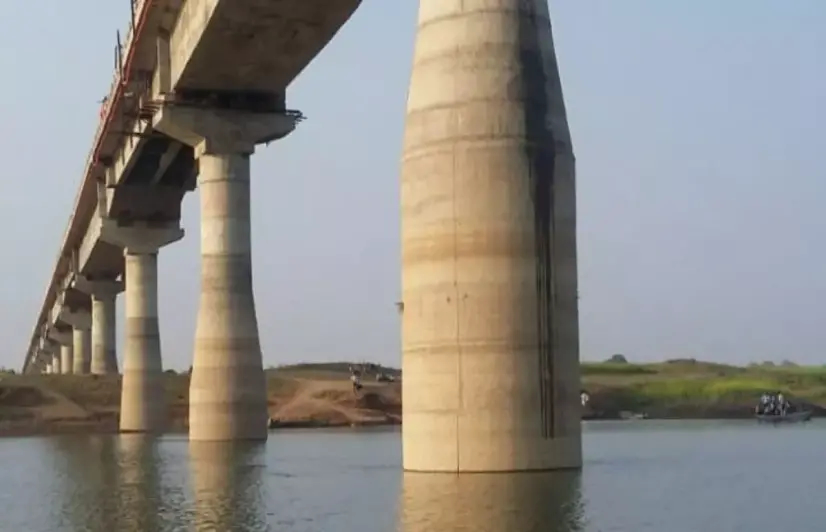Five months after road closure, Chhoti Mahanadi bridge repair yet to begin

Five months after road closure, Chhoti Mahanadi bridge repair yet to begin
Tourists, locals and businesses suffer as bridge develops cracks around the spot that was repaired five years ago, in addition to newer, more serious damage
Katni, Madhya Pradesh: When Chhoti Mahanadi bridge was open for traffic, tourists from Khajuraho could easily reach Bandhavgarh National Park through Barhi Nagar. Those travelling to popular destinations such as Maihar, Amarkantak, Chitrakoot, Prayagraj and Varanasi also took the bridge located on State Highway 11 on the Barhi-Maihar Road.
With the bridge closed for repairs since November 26 last year, tourists are forced to put up with a bumpy ride that involves a 75-km detour! Five months have passed, but the work is yet to begin. Not aware of the bridge’s condition, many still come here only to leave disappointed.
Built under the Bansagar Project in 2005 at a cost of Rs 15 crore, the 900 m bridge slowly began to sink, with a central pillar going down by around two ft. In 2018, when cracks were spotted during an inspection, the state government invited tenders for repairs and spent Rs 7.5 crore on it.
Last October, heavy vehicles were barred entry after cracks were spotted in the areas adjacent to where repairs were done earlier and on the lower part of the bridge. The very next month, Katni district Collector Avi Prasad banned the entry of all types of four-wheelers by issuing an order under the Disaster Management Act.
Soon, the bridge was barricaded on both ends with commuting possible only on two-wheelers or on foot. “Many of the vehicles that took this route transported tourists. All the hotels here did good business when the bridge was operational. All of us are dealing with a 75% reduction in business now,” said Barhi-based hotel owner Ajay Verma.
Business worth Rs 20,000 per day was an easy affair for Verma when the bridge was functional. As it has come down to around Rs 8,000, he had to reduce the number of staff from 12 to five. Even paying those five workers on time has become difficult now.
Other businesses in the area have also seen 50 to 75% reduction in sales. Textile trader Anand Saraf said his monthly income has fallen from Rs 3 lakh to less than Rs 50,000. He had to send off both his employees due to the drop in sales.
“People from more than 30 villages on the other side of the Mahanadi used to come here for shopping. All the textile traders are suffering. If the situation remains the same, running the household will become difficult,” Saraf added.
Farmers from these villages also depend on the market in Barhi for fertilisers, seeds and other agricultural resources. But the bridge closure has forced them to go to Katni market, Maihar or Satna, all located at greater distance. Right now, the farmers are in a precarious state, having harvested their crops but clueless about how or where to sell the produce.
Farmers have requested the local administration to make alternative arrangements, to which they responded by launching the process to procure closer to home.
“I reside in Barhi, but my farm is on the other side of the Mahanadi bridge, in Itora village. Every day, I have to cross the bridge to manage my farm. What took only a few minutes earlier has turned into a cumbersome task now. There are thousands of people like me who are very upset due to the loss of connectivity,” said Ramesh Tiwari, a retired teacher whose extended family lives in Itora. Several residents of Barhi claimed they have been cut-off from Satna, Maihar, Rewa, Shahdol, Anuppur, Katni, Jabalpur and other districts.
The students of Barhi Government College, who come from Itora, Kuteswar, Hardua, Khirwa and many more villages located on the other side, have to cross the bridge on foot. Auto services are available on both sides of the bridge, but hop-on/hop-off is time-consuming and not cost-effective. Reaching colleges or schools in time has become a task.
The current estimate for repairs is Rs 22 crore, excluding the Goods and Services Tax. On what necessitated repairs again, Praman Kumar Tripathi, Executive Engineer, Bansagar Project, told 101Reporters that a flawed design that couldn't withstand the increased traffic was the main reason.
“We are trying to correct the issues, which is why so much money has to be spent on the bridge from time to time. The vehicular movement was less in the beginning, which is not the case now. So we have to keep the bridge in good condition. The new cracks were noticed in the same spot where repairs were done five years ago. The departmental process for the present set of repairs has begun. It is likely to start soon, for which we are expecting approval from the state government within a week’s time,” he said. A week later, when we checked with the Engineer again, they were still waiting on the approval.
Cover photo - The 900 m bridge was built at the cost of Rs 15 crore in 2005 but will now take 22 crores to repair and correct (Photo - Sujit Singh Baish, 101Reporters)
Edited by Rekha Pulinnoli
Would you like to Support us
101 Stories Around The Web
Explore All NewsAbout the Reporter
Write For 101Reporters
Would you like to Support us
Follow Us On
 Auto services are available on both sides of the bridge, but hop-on/hop-off is time-consuming and not cost-effective (Photo - Sujit Singh Baish, 101Reporters)
Auto services are available on both sides of the bridge, but hop-on/hop-off is time-consuming and not cost-effective (Photo - Sujit Singh Baish, 101Reporters) 
